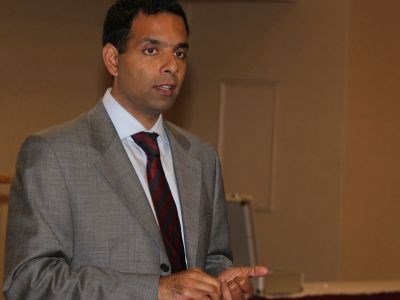Back in 1900, dementia was at No. 10 on the list of the things most likely to kill you.
The top three on the list were influenza, septecemia and diarrhea.
These days, dementia has moved up to No. 7 on the list of conditions people die from, according to geriatrician Dr. Samir Sinha, the provincial lead for Ontario's Senior Strategy.
The reason dementia has become more prevalent is that today's society just has more seniors, he said. At the turn of the 20th century, the average life expectancy was 51 years old, as opposed to nearly 80 years old today.
It becomes increasingly likely that you'll die from dementia the older you get, Sinha said. For those over the age of 75, dementia is the fifth leading cause of death, and for those over 85, it's the fourth leading cause of death.
And society is set to get even older — the number of Ontarians over the age of 65 will double over the next 20 years, he said.
These are some of the statistics Sinha plans to share at the Alzheimer Society Sudbury-Manitoulin's annual Alzheimer Awareness Dinner on Jan. 22, which starts at 6 p.m. at the Radisson Hotel.
Keeping the fact that the province's population is getting older — and will soon suffer even higher rates of dementia — there will be an increasingly large burden placed on community care services, Sinha said.
That's why it's important to change the way the province provides those services, he said.
On Jan. 8, Sinha released a report called Living Longer, Living Well, which makes recommendations to the province on revamping seniors' services.
He said the report focuses on ways to ensure Ontario has “elder-friendly communities that understand the diversity of needs amongst the older population.”
Sinha said he's working with the province to implement his recommendations.
“When I was appointed by the government, it wasn't only to draft or design a seniors' strategy, but it was to stay on and implement the strategy as well,” he said.
“Already, what's really heartwarming to see is that already some of my key recommendations have been adopted.”
One recommendation the province has moved to implement is a promise to connect every older adult in the province with a primary care provider if they want one.
This is particularly important to those suffering from chronic diseases such as dementia, Sinha said.
He said there are many seniors, especially in Northern Ontario, who are forced to go to hospital emergency departments and walk-in clinics because they don't have a primary care provider.
The province has found that family health teams and community health centres — even in Northern Ontario, where there's traditionally been a shortage of health-care workers — have capacity to take on new patients.
The problem is that seniors aren't always using Health Care Connect, a provincial program designed to help citizens find primary care providers, Sinha said. He said the province is looking into finding ways to help seniors better access the system.

Already, what's really heartwarming to see is that already some of my key recommendations have been adopted.
Dr. Samir Sinha,
provincial lead for Ontario's Senior Strategy
The province has also acted on several other recommendations in the report, including funds to provide more training for health-care workers dealing with people with dementia who also have behavioural issues, Sinha said.
This is a “huge issue,” because if workers in long-term care homes can't properly deal with these behaviours, clients might end up in hospital as an alternate level of care (ALC) patient, contributing to the ALC crisis, he said.
As well, if there's an ALC patient exhibiting these behaviours, they're much less likely to receive a placement in a long-term care home, as these facilities are ill equipped to deal with such behaviours, Sinha said.
Given the context of an ever-increasing cohort of seniors with dementia, the work done by branches of the Alzheimer Society across the province is important, he said. “I think they do phenomenal work.”
The organization is a great help to those diagnosed with dementia and their families, Sinha said.
Given that it costs $48,000 to keep one person in a long-term care facility for a year, it makes sense to support organizations like the Alzheimer Society who may be able to help keep those with dementia in their homes longer, he said.
“If we can actually give an older person with dementia information and access to the right supports they need to stay independent in the community, for example, this would delay their need to actually enter a long-term-care facility.”
Tickets to the Alzheimer Awareness Dinner cost $50 each, or $375 for a table of eight. For more information, contact the society at 705-560-0603.
